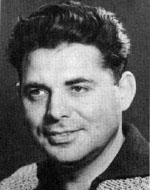Son of Shraga and Esther. Was born on the 22nd of Tevet 1931 in Jerusalem, his father, a member of the former Labor Battalion, was a man of manual labor who nurtured Aryeh’s physical ability even when he was a baby and laid the foundation for Aryeh’s personality as revealed in his two “worlds” He graduated from the “Wingate” Institute and was a member of a youth movement and a member of the Haganah. He was always in a high mood, without any resemblance to the morale of the guys, and when he went out with his friends to the squad commander’s course, the physical training was difficult and arduous, And each of the course participants was in a bad mood, but only Aryeh remained in high spirits and encouraged the rest. He was a shy boy, but at the same time he was honest and obstinate, who could stand up stubbornly and did not budge when he was sure he was right. Aryeh was willing to suffer, to compromise and give up on what he thought was right. He was always willing to help his friends by carrying backpacks and encouraging their spirits by laughing and singing to keep them going and going. When the road to Jerusalem was blocked and it was clear that the war was about to break out, Arie joined a group that began training young people in Givat Ram. In January 1948 he managed to leave Jerusalem in the last convoy to a course that was held at the Urim training center near Ra’anana. In March 1948 he was sent to Kiryat Meir and an attempt was made to return him to Jerusalem with his other friends. With the convoy of “Nachshon” stuck in the middle of the road and did not reach the city. He then joined the “Maccabi” convoy and arrived in town. Together with the escorts of the “Maccabi” convoy, he was attached to the Beit Horon Battalion, which was in the Schneller camp; There he was seen by the commander of the Military Police, who had been Aryeh’s teacher at the elementary school. He determined that Aryeh would be in his regiment. But Aryeh did not look like a military policeman in the besieged city; He was ashamed of him, looking for a way to join the convoy that had left the city. He spent the rest of the War of Independence as a soldier in the First Battalion of the Palmach, and when he returned to Jerusalem at the end of the war he expected a military trial for desertion from the military police, which was eventually canceled. Here he worked for a while in the metalwork shop, and then he was a shepherd in the place – he loved it very much. In his civilian life, Aryeh was a sportsman, in whom he saw both profession and hobby. Many have worked in this area. Within the framework of the organization was a sports center in the settlement of immigrants and a supervisor on behalf of the Sports Authority for its activities in youth clubs in the Jerusalem area; In the practical framework he was a teacher at a seminar, university, regional school “Judean Mountains” and more. He was also a coach in the basketball game at Y.M.C.A, “Hapoel” and at the university. During his service in the reserves, he advanced, took an officers’ course, and reached the rank of lieutenant. During the Six-Day War he participated in the battles in the Judean Hills and was one of the first to enter Bethlehem and Hebron. This was on Monday, 28 June 1968. He placed a wife, a son and a daughter, and was laid to rest in the military cemetery on Mount Herzl in Jerusalem, and wrote in his condolences to his wife that in the war, “Then what was revealed to me was perfection and especially perfection with himself.” He continued: “Arinka was whole with himself, with his way and turned him around. He was whole with his men, proud of them and proud of his accomplishments and striving to achieve perfection with cleverness, peace and patience – and managed to impose his authority on his friends and friends – – “The smile and the song the commander writes were his weaknesses in moments of tension,The song “Relax, Yafig, will be a bunch of fist for Izzuz and Ma’as.” A booklet in his memory “Arinka” was published by the Hapoel Center in cooperation with the Sports and Physical Education Authority in the Ministry of Education and Culture and the Wingate Institute for Physical Education and Sport. His memory was included in “Physical Education,” a bi-monthly magazine published by the publications section of the Wingate Institute, the Sports and Physical Education Authority in the Ministry of Education and Culture. In the memorial book for students, teachers and employees of the University of Jerusalem, who were killed in the Six-Day War and three years later, is the book “Nizkor”, edited by Yehuda Ha-Ezrachi, his history was brought.
